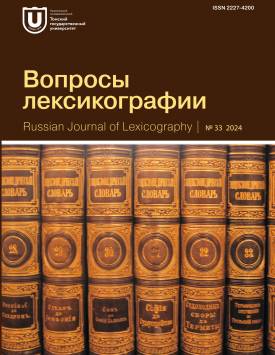Psychological and extralinguistic aspects of French and English neological lexicography
The article aims to identify trends in modern neological lexicography, consider different approaches of lexicographic projects to the selection of potential neologisms and the creation of new dictionary entries. The scientific originality of the work lies in the analysis of the psychological and extralinguistic aspects of the selection of neologisms in French and English dictionaries. The main research material is neologisms collected using a continuous sampling method from French and English electronic lexicographic editions, such as Academie Franjaise, Le Robert, Le Petit Robert, Larousse, American Dialect Society, Cambridge Dictionary, Merriam-Webster, Australian National Dictionary Center, etc. Methodologically, the study employs the method of structural-semantic description of new lexical units - interpretation of neologisms using observation techniques, intralingual comparison, sociolinguistic interpretation; the method of lexicographic analysis - the study of language units from the point of view of lexicography allows us to systematize language material, identify its features using various techniques; the method of contextual analysis - observation of changes in the meaning of a word relative to its contextual environment. The author examines the objectivity of the selecting criteria, based on online survey results from the point of view of the psychology of novelty perception. A number of factors are considered that influence the survey participants’ responses and affect the legitimacy of the selection. The article describes the process of neologisms’ diffusion among the members of society, and its main elements are: innovation, communication channel, time and social system. Various points of view are given on the methodology for considering potential neologisms. The author comes to the conclusion that it requires an extended lexicographic approach, which is a hybrid of the corpus and lexicographic approaches. Due to the emergence of new digital programs we can witness new factors that complicate the lexicographer’s work, such as special applications for increasing the percentage of text uniqueness. The article examines the extralinguistic reasons for the emergence of new units caused by language policy. According to the data collected for the research, online survey results rarely correspond to those obtained by the expert team; therefore, we present another option, the Google Trends service, for the verification of neologisms before the inclusion into the dictionary. The author declares no conflict of interests.
Keywords
neologisms, neological lexicography, verification of neologisms, perception of novelty, diffusion of neologisms, French lexicographyAuthors
| Name | Organization | |
| Arkhipova Elena I. | Novosibirsk State Technical University | elena1503@inbox.ru |
References

Psychological and extralinguistic aspects of French and English neological lexicography | Voprosy leksikografii – Russian Journal of Lexicography. 2024. № 33. DOI: 10.17223/22274200/33/1
